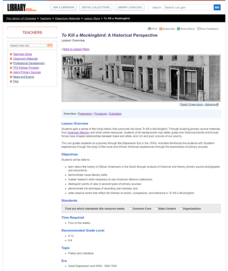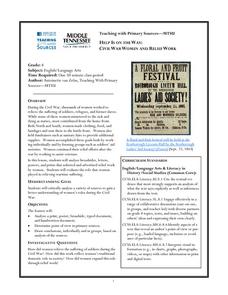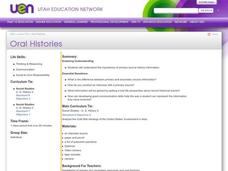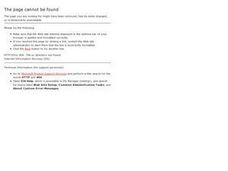The New York Times
Teaching the Vietnam War with Primary Sources from the New York Times
Use the New York Times database of primary sources to teach a unit on the Vietnam War. The resource consists of a variety of primary sources as well as a lesson plan showcasing how to teach a instructional activity using them....
Curated OER
A Primary Source Picture Book
Travel through Europe with ten-year-old Teddy Roosevelt in this writing activity, which uses the picture book My Tour of Europe: by Teddy Roosevelt, by Ellen Jackson. After reading the book, readers compare it to passages from The...
Curated OER
Using Primary Sources to Study the Holocaust
Engage your middle schoolers with Pastor Martin Niemoller's famous poem that begins, "First they came for the communists." Now that you have their attention, send learners to the various work stations you created to have them explore...
Curated OER
Teaching With Documents: U.S. Constitution Workshop
What does it mean to be American? Explore the constitution and what it really means to be a citizen here. First, learners of all ages will investigate different primary source documents. Then, they establish each document's...
Curated OER
Primary Sources and Protagonists: A Native American Literature Unit
Introduce your middle schoolers to the lives of past Native Americans. First, learners work together to put photographs in a sequence. Then, using their sequence, they create stories to share with the whole class. No matter how old your...
Curated OER
Reading Primary Source Documents: Comparing Sources
Students analyze and compare various primary source documents. They formulate historical questions based on the documents.
Curated OER
Applying KWL Guides to Sources with Elementary Students
What is a KWL chart? Here is a well thought-out activity that has learners use KWL charts to gain historical perspective. Your class examines primary sources about historical events and identifies what they know, want to know, and,...
Curated OER
Tintin and I: Primary and Secondary Sources
Mickey Mouse, Elmo, and Tintin? Belgian cartoonist Georges (Herge) Remi’s famous comic character launches a study of primary and secondary source material and the impact these sources have on storytelling. Class members also examine the...
City University of New York
Urban Politics: Machines and Reformers
Take a trip to the turn of the twentieth century with a resource about industrialism in America. With primary source documents and focus questions, learners think about the ways that government groups and organizations paved the way...
Curated OER
Exploring the Irish in America Through Found Poetry
What was life like for Irish immigrants settling in America during the late 1800's? Learners examine primary source documents, such as lyrics, poems, and letters, to understand the immigrant experience. They then use those primary source...
Library of Congress
To Kill A Mockingbird: A Historical Perspective
Students study the novel, To Kill a Mockingbird. Through studying primary source materials from American Memory and other online resources, students of all backgrounds study the relationships between blacks and whites.
Curated OER
Create a Magic Lantern Show; Freed People in the Reconstruction South
Engage your scholars by having them create "magic lantern shows" inspired by the film Dr. Toer's Amazing Magic Lantern Show: A Different View of Emancipation. As they study the South's Reconstruction through primary...
Middle Tennessee State University
Help Is on the Way: Civil War Women and Relief Work
The role women played in the Civil War, especially in relief efforts, is the focus of this seven-page resource. Groups examine primary source materials to determine how this work reflected and expanded the traditional roles women held in...
Historical Thinking Matters
Spanish-American War: 3 Day Lesson
Why did the United States choose to invade Cuba in 1898? As part of a 3-day lesson, your young historians will first develop working hypotheses to answer this question, then work with a variety of historical primary source documents that...
Roy Rosenzweig Center for History and New Media
Labor Unions in an Industrializing U.S.
Have class members eager to enter the workforce? They'll be glad to learn that things aren't how they used to be. Have your young historians examine then discuss four primary source images related to the negative effects of...
Ford's Theatre
How Perspective Shapes Understanding of History
The Boston Massacre may be an iconic event in American history, but perhaps the British soldiers had another point of view. Using primary sources, including reports from Boston newspapers and secondary sources from the British...
Civil War Trust
Civil War Soldier: Experiencing the Battle of Franklin
Fighting a war over home soil makes a living nightmare even more real. Class members describe the experience of a Civil War soldier during the Battle of Franklin, poised right at a major turning point of the war, after researching the...
National Endowment for the Humanities
Lesson 2: The United States, France, and the Problem of Neutrality, 1796–1801
While the French Revolution could be considered inspired by the American Revolution, it created thorny problems for the new United States. Should the United States get involved and be drawn into a European drama? Was the US strong...
National Endowment for the Humanities
Using Historic Digital Newspapers for National History Day
Your learners will take a trip through history as they peruse through historic digitalized newspapers, reading real articles from such historical periods in the United States as the Temperance movement...
EngageNY
Building Background Knowledge: The Internment of Japanese-Americans during WWII, Part 3
Check those sources carefully. Scholars learn to analyze and critique primary sources with the work they completed in the previous activity. Learners compare and contrast sources that agree and disagree about Japanese-American internment...
Curated OER
Whose History Is It Anyway? Patterns in History
Read and examine primary source material in order to analyze, synthesize, and debate information about the Great Depression. Critical analysts research various source materials related to the Great Depression. They work in teams to...
Curated OER
Oral Histories
Distinguish the difference between primary and secondary sources. High schoolers discover how to conduct an interview using an individual as a primary source, and why it is important to get a real-life perspective. They either video or...
Curated OER
William Apess and the Mashpee "Revolt" of 1833
Prompt your class with the following question: What was the status of American Indians in Massachusetts during Jackson's presidency? To answer this question, class members will read a series of primary source documents (attached),...
Curated OER
Exploring George Washington's Leadership
Students examine primary documents to determine whether or not George Washington was an honest leader. In this presidential history lesson, students evaluate Washington's leadership prior to and during his presidency. Guided reading...























